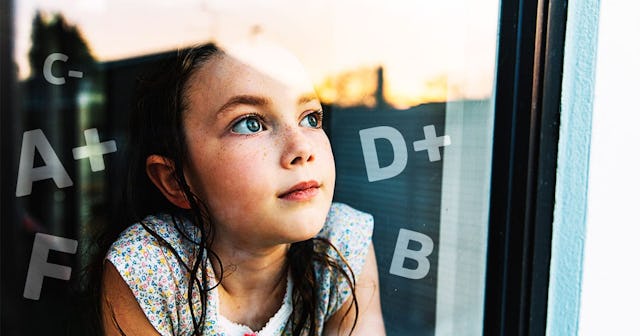Maybe Now We Can Stop Judging Teachers (And Students) By Test Scores

Recently, Patrick Kelly, a finalist for South Carolina Teacher of the Year in 2014 and a Teaching Ambassador Fellow for the U.S. Department of Education from 2015-2017, wrote an article titled “This School Year Will Not Be Measured By a Test Score.” In it, he talks about how he always worries, this time of year, whether or not his AP Government students will remember what they need to from the “high pressure” test they’re about to take. This year, he isn’t worried about what classroom knowledge they’ll retain. He’s worried about what they will remember.
His essay’s been making the rounds among my husband’s fellow teachers, and it’s worth sharing with parents, teachers, educators, and anyone who’s scrambling with home education (ahem, crisis education).
Kelly emphasizes that academic knowledge isn’t what children will learn in the midst of this crisis — and it’s not what he wants them to learn. Instead, his main concerns are that children walk out of this school year remembering that they’re worth more that a test score. He wants them to remember the power of relationships and the interconnectedness of the world. He wants them to remember, rather than the academic information needed to pass an AP exam, that “we can always control how we react to our circumstances and to the circumstances of those around us” and that inequality is real. This teacher isn’t looking at a packet of work. He’s looking at life lessons and mental well-being.
And he isn’t the only one. In Australia, the staff of Carrington Public School sent a message home for when parents or kids feel like they’re at the end of their rope. “Start a book and read together as a family. Snuggle under warm blankets and do nothing,” was one suggestion. One teacher, Dr. Roy, suggested that most everyday activities — from movies to cooking — can be education-based, comforting, normal. They can help children. They can also lead to a kind of “deeper learning.”
Like the rest of us, kids are still struggling to find their footing in this new reality. They have been uprooted; they have been removed from their regular routines; they have been yanked from their social lives; they have been confined; they have been exposed to excessive parental anxiety. Many have experienced food shortages or at least anxiety over food (not to mention toilet paper).
In order to learn, kids need to feel secure. Teachers will recognize that — and realize that in the midst of COVID-19, they are attempting to teach children who are at best adjusting, and at worst feeling anxious or unsafe.
Carter Diastika/Reshot
The Washington Post records several things that teachers can implement in an online classroom or digital environment to help teach kids in this format. First, they can establish a routine. Kids thrive on routine. They like to know what’s going to happen next; it gives them a sense of safety and security in the midst of chaos — when life seems, as Kelly says, very uncertain.
Most importantly, the Post says that “relationships and well-being can take priority over assignment and behavioral compliance.” In other words: it doesn’t matter if your kids turn in the assignments or sporadically attend online class. What matters is that they feel safe, that they have some understanding of what’s going on in the world, that they have the emotional tools they need to get through the pandemic safely and in a healthy manner. They need to feel valued. They need to feel welcome. They need to feel like they belong. And it’s a teacher’s job, more than anything else, to make them feel that way.
Teachers like Kelly, and those at Carrington School, those who seek to mitigate the anxiety some children experience on a day-to-day basis, can make a huge difference in the way children experience and process this unsettling situation. We know that from the studies done on children who experienced Hurricane Katrina. Those kids were uprooted. They lost the protections that school afforded. Many of them were shunted into other schools. The kids, The Atlantic says, were not all right, and in fact were the most vulnerable among us.
The effects were the worst in children from low-income families and children of color —the kids we know are more likely to be exposed to experiencing the death of loved ones from COVID-19 and things such as money worries and food anxiety. Those kids, say The Atlantic, were more likely to “suffer emotional disturbances than other kids.”
A teacher who cultivates routine and consistency, who cares, who shows concern for their kids’ well-being, who reaches out, who makes sure their kids have access to the internet — they could possibly help mitigate those circumstances. They could be the equalizers, the way brick-and-mortar schools serve as equalizers in normal times.
We need our teachers, now more than ever. But we don’t need teachers pushing packets and academics. We need teachers pushing mental well-being and inner strength. We need teachers helping. We need those equalizers, those carers, those who reach out.
We need more Patrick Kellys.
This article was originally published on